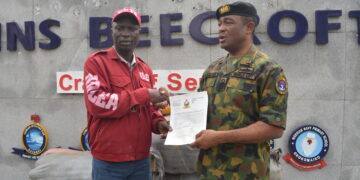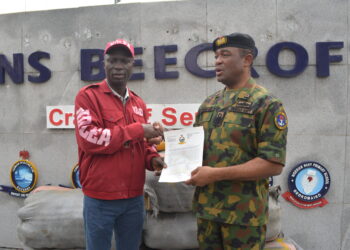Mr Chuks Njemanze, Chairman, Lilypond Chapter, Association of Nigerian Licensed Customs Agents (ANLCA), on
Friday advised the Nigeria Customs Service (NCS) that the Pre-Arrival Assessment Report (PAAR) should not be seen as an advisory document.
Friday advised the Nigeria Customs Service (NCS) that the Pre-Arrival Assessment Report (PAAR) should not be seen as an advisory document.
Njemanze, who made the plea in an interview with the News Agency of Nigeria (NAN) in Lagos, said PAAR should
not be misrepresented as an advisory document.
not be misrepresented as an advisory document.
He explained that customs operatives should have expressed their satisfaction before issuing PAAR in order to free the document from query.
“We are still battling with the issue of PAAR being issued by customs and the same customs still querying it, which by my own understanding is not supposed to be.
“They keep saying that PAAR is advisory. PAAR should no longer be advisory, coupled with the fact that it is
issued by customs.
issued by customs.
“They (Customs) should go back and ensure that once PAAR has been issued, the only thing that is acceptable as
query in PAAR should be on quantity or wrong declaration,’’ Njemanze said.
query in PAAR should be on quantity or wrong declaration,’’ Njemanze said.
He, however, said that PAAR had performed well so far because the service was able to manage the volume of work
erstwhile handled by the three Destination Inspection Service providers.
erstwhile handled by the three Destination Inspection Service providers.
“I will tell you that PAAR has been a success considering the time frame within which the customs service was
able to adjust to the demand.
able to adjust to the demand.
“But it is the responsibility of the examination officer to open the container and see if actually what you
declared is what it contains.
declared is what it contains.
“If there is contradiction in terms of quantity or the nomenclature of what you have declared, fine, the
query is acceptable.
query is acceptable.
“But not for them to query value because the importer ought to have declared the quantity and if they were
not satisfied, they shouldn’t have issued PAAR,” Njemanze said.
not satisfied, they shouldn’t have issued PAAR,” Njemanze said.
Speaking about queries on PAAR, Comptroller Eporwei Edike, the Customs Area Controller, Apapa Command, said the
document was mainly queried due to contradictions in declarations.
document was mainly queried due to contradictions in declarations.
He said that PAAR could serve as an advice based on what the importer or agent must have declared and subject
to query if physical examination showed otherwise.
to query if physical examination showed otherwise.
“Of course, the importer’s form ‘M’ tells us what they are paying; the quantity and everything.
“But if we open a container and find that there is a difference between what the importer wrote in the PAAR
and what is in the container; won’t that PAAR be queried?
and what is in the container; won’t that PAAR be queried?
“That means false declaration and such goods are liable to seizure but we don’t seize. We just allow them to
clear it and give them the penalty to pay.
clear it and give them the penalty to pay.
“So, if an importer or agent wants a clean slate, he should also come out clean with his PAAR not to be
queried,’’ Edike said.
queried,’’ Edike said.
































































